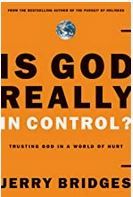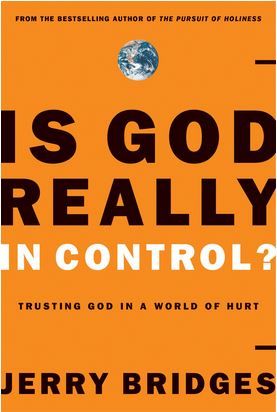If you are looking for a book that connects theology to real life, read this book. It will challenge how you think about God and His control over the world.
Bridges breaks down into several areas of consideration the topic of trusting God. The principle of God's good sovereign control over the world provides the foundation for his argument in this text. Bridges asserts that this concept must be understood and accepted to truly trust God. He begins by answering the primary question for the believer who wants to understand and trust God; "Can you trust God?" Bridges does not stray from the difficult considerations in his question. He accepts that it is easier to obey God than to trust Him.
Bridges moves from this question to examining other aspects of the topic mostly focused around God's sovereignty, wisdom, love, power, and control. He also applies these ideas to how trusting God helps with our growth, experience, and submission to His work in our lives.
Bridges masters the art of Bible study and application, thus making this book biblically sound. He also responds to Harold Kushner's arguments in When Bad Things Happen to Good People. He addresses areas of disagreement with Kushner's understanding of God's working in the world. Bridges also cites several early American theologians and some puritans as he makes his case for God's sovereign control.
This book should include a Scripture index. An index would make finding specific quotes easier for the reader who wants to look back without having to scan the entire text. As Bridges' book is saturated with Scripture, finding specific references can be difficult.
Bridges does not claim to be a theologian, however his skill as a Bible student makes up for any lack of theological credentials. He expounds a deep understanding of theological concepts and guides the reader through the issues pertaining to God's sovereignty in a relatable concise manner. He writes as one who has wrestled with the questions personally.
He does not attempt to simplify the discussion, but to make it more understandable for every reader. His manner of communicating complex issues makes them understandable.
The most impactful statement in the book for me was about the difference between obedience and trust. Bridges writes, "I have spent a good portion of my adult life encouraging people to pursue holiness, to obey God. Yet, I acknowledge that it often seems more difficult to trust God than to obey Him" (18). Separating these ideas brought me to a full stop. I considered the implications of this idea from my perspective and from both a parental and pastoral perspective. The depth of his simple observation brings me to my knees. Far from the only valuable insight in the book, mining the depths will take more than one reading.

I am building my daughter's libraries. I want them to have good books from impactful authors. This book will be one of those that they receive from me. I may require they read it before they can leave home (yes I am smiling as I write this). I want my girls to know, obey, and trust the God they have been called to serve.
This text would be a great guide for family devotionals. Each chapter is around 15 to 20 pages in length. Reading and discussing a chapter each week would bring added value to a family's devotional life.
In counseling, this book would be helpful for someone struggling with trusting God as He works in their life. A chapter each week would give a counselee much to consider between counseling sessions.
No surprise here, I have decided to obtain everything Bridges wrote. Reading his work is worth the time and effort.


